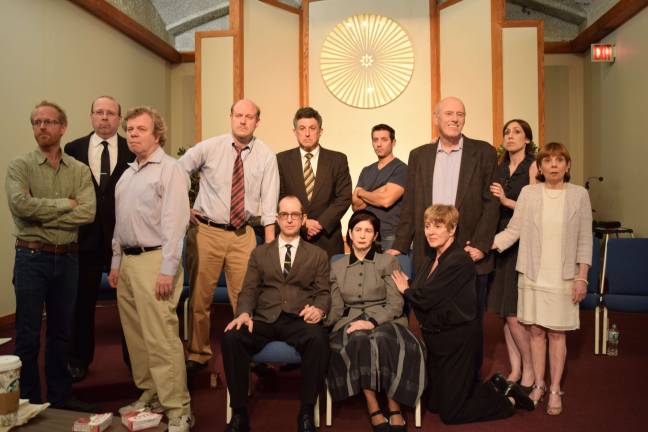Espionage on the stage performance

Betrayal can make for good theater.
Such is the case with “The Brother,” a play about the real-life trial of Julius and Ethel Rosenberg, who were executed in 1953 for espionage and providing information about the atomic bomb to the Soviet Union. Performed as a staged reading on Sept. 28 at the Unity Center of New York City on W. 58th Street, the play is based on reporter Sam Roberts’ 2001 book of the same name, and centers on Roberts’ interviews with Ethel’s brother, David Greenglass, decades after his testimony secured his sister’s death.
“There isn’t a nice person in this play,” said Elowyn Castle, the show’s director. “Except maybe Ethel, who’s a victim of all these circumstances.”
The play, written by John Hancock and Dorothy Tristan, first opened in Chicago in 2007, but has been little performed since, said Teri Black, the founder of Break a Leg Productions, the company staging the reading.
Black first saw a reading of the play at the City University of New York about three years ago, where she met Roberts and the playwrights. She was “intrigued” by the play, and is now staging the show as the inaugural performance of Break a Leg’s new series of historical plays, “Historically Speaking.” (The company, which started as a group of friends reading plays in Black’s apartment while she recovered from a broken leg, also runs a series of science-themed plays, called “Art of Science” as well as “Unexplored Territories,” which focuses on new plays.)
“The brother is the heavy,” said Black. “He turns the screw, but there’s more to him than that.”
Roberts, an urban affairs correspondent for the New York Times, spent several hours interviewing the elusive Greenglass, who was living under another name (in the play, Roberts’ character receives an anonymous tip as to Greenglass’ alias and whereabouts). The play focuses mostly on David, whose false testimony spared him and his wife, Ruth, but sealed his sister’s fate.
“Part of the whole fascination of writing this book and reporting “The Brother” was drawing David out and sitting down with him all those hours, and having no idea what he was going to say,” said Roberts in a phone interview.
“He could have engaged in hours and hours of self-justification and attempts to vindicate himself, but for the most part, he dug himself in deeper and deeper and incriminated himself more than anything else.”
In the performance, 13 actors play 32 roles. Most characters, including Julius, Ethel, Ethel’s mother, Tessie, and the prosecutor Roy Cohn, exist in flashbacks as David, played by Richard Litt, recounts his story during interviews with Roberts’ character, played by Bruce Barton, decades after the trial.
Actors read directly from the script, and sit in a row that extends the width of the space at Unity Center, a room with crimson carpet, wood trim and finicky lighting that, during a recent rehearsal, actors attempted to adjust. Performers stand when in a scene, and retreat to their seats once finished.
While characters’ behavior might baffle a modern audience, the circumstances can make their actions at least understandable, if not quite empathetic.
“These people don’t think they’re not likeable,” said Castle. “You look at them with hindsight and you think, how naïve could they have been? But you understand David’s wanting to protect his wife. You understand his own psychological determination.”
Julius and Ethel Rosenberg’s case still fascinates some members of the cast, and has received renewed attention following the revelations in Roberts’ book. In August, following the release of previously-sealed documents, including grand jury testimonies, Julius and Ethel’s sons penned an Op-Ed in the Times, asking for their mother’s exoneration.
“I think the story is specific to the time but the behavior is absolutely not,” said Castle. “There are always people who go charting off after a vision, a principal, misguided or not. There certainly is today. There’s betrayal, self-protection. All the human behavior in this play is universal.”
When discussing the story of the Rosenberg trial, Roberts, who will lead a conversation with the audience following Monday’s reading, finds that most people want to know about David’s personality, and why he condemned his sister. The answer, Roberts said, is complex.
“What I was looking to do was allow the reader, allow the viewer to put themselves in the place of the characters and ask themselves, ‘what would you have done?’” he said. “Given the temper of the times, what would you have done in this situation? And understand that it’s a much more complicated challenge and more complicated set of circumstances than, ‘why did you send your sister to the electric chair?’”